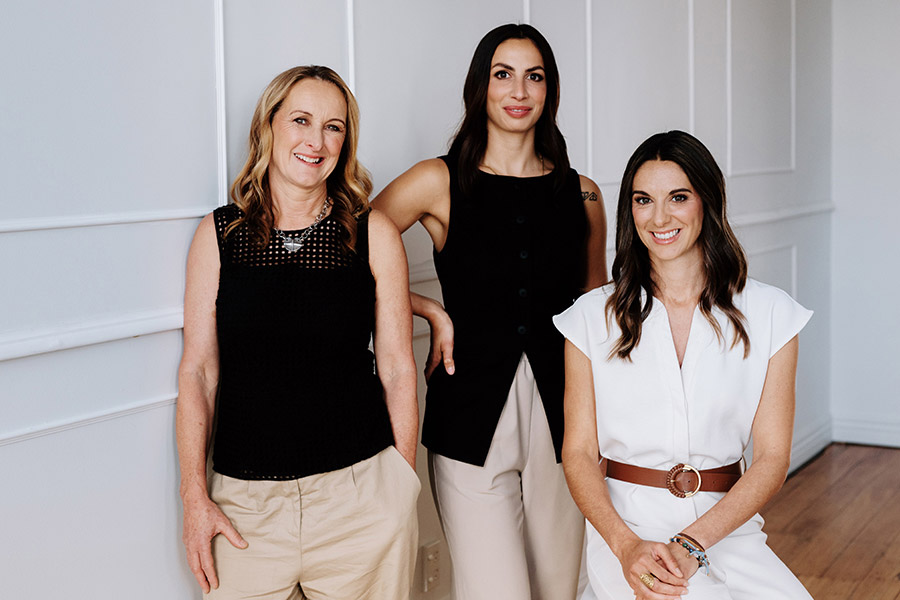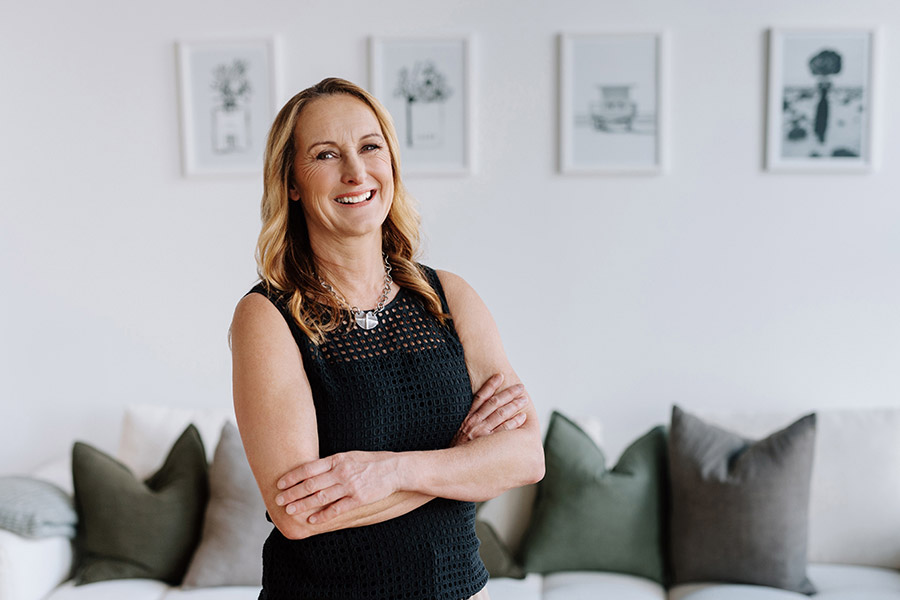Women in deep tech: The founders changing the face of innovation
6 September 2024
Meet some of the inspiring female innovators who are transforming the deep tech landscape in New Zealand.

There is a growing recognition of deep tech's potential in Aotearoa New Zealand, inspired by the recent global success of several Kiwi startups. Increasingly, female entrepreneurs and innovators are at the forefront, founding and leading some of our most promising emerging companies. We spoke to three women at different stages of the startup journey to find out how they got where they are now, and what they've learned along the way.
Redefining post-surgical bras with 3D 'knit to fit' technology
Victoria University of Wellington researcher Xuxu Amoozegar-Montero is on a mission to revolutionise bras for women who have undergone breast surgery.
While pursuing her master's in design, Xuxu devised the concept of using 3D scanning and knitting technology to create custom-made bras tailored to women's unique bodies, sparking her PhD project.
She soon realised the technology had a significant application for women who have undergone breast surgery, particularly those who have had a reconstruction or lumpectomy.
"There is an immediate need for people who have had breast surgery – their bodies have changed, their old bras don't fit, and stores offer no suitable solutions,” explains Xuxu.

Xuxu Amoozegar-Montero is using 3D knitting to create custom-fit post-surgical bras
Xuxu is supported by her sister Aïda, also a Victoria University of Wellington PhD graduate, who specialises in sociology. Aïda's research complements Xuxu's by highlighting women's post-surgical experiences and the impact on their body image and identity.
"Nearly 90% of breast cancer survivors report that bras are important for self-esteem after surgery," says Xuxu.
Together, the sisters focused on creating bras that offer comfort, confidence and a custom fit.
Supported by Wellington UniVentures and the KiwiNet Emerging Innovator Programme, Xuxu and Aïda developed the skills and networks to transform their academic work into a commercial venture.
"In my design studies, I always wanted to make something that has an impact in real life, instead of just existing in a research bubble," says Xuxu.
The sisters secured PreSeed Accelerator Funding to trial their technology and conduct market research, revealing the specific needs of women who have had breast surgery and identifying sustainability issues within the bra industry.
By custom knitting bras using sustainable yarn, their products will not only be more comfortable, but also better for the planet.
With the help of the KiwiNet Spin-out Programme, Xuxu and Aïda are now preparing to launch their spin-out company, Uuna, which means 'unique' or 'the one'.
KiwiNet has been instrumental in connecting the sisters with commercial mentors, which they say has been invaluable as they prepare to secure private investment. US-based Shama Amalean Skinner has joined Uuna as an advisor, drawing on her experience as former COO of revolutionary period underwear company Thinx.
"There is so much more meaning to this seemingly simple product," Xuxu reflects. "We're not just designing a bra; we're creating a manufacturing and fitting experience that doesn't exist yet."
With a 3D knitted bra prototype and a custom app under development for 3D scanning and measuring, Xuxu knows launching to market will be her biggest challenge yet. With the right support in place, she feels up to the task.
“Change is constant, and you'll receive advice from various perspectives along the way. However, it's crucial to remain true to your mission and values, allowing them to guide your business decisions,” says Xuxu.
Thinking outside the box for sustainable packaging solutions
As CEO of ZealaFoam, Sarah Heine is leading the charge in developing a sustainable, 100% plant-based alternative to polystyrene.
Polystyrene is widely used due to its lightness, strength, and insulating properties. However, companies are increasingly seeking alternatives to meet customer demands, their own sustainability goals or regulatory pressures.
"Globally, there is a strong push for change in the way we package things but until now polystyrene has been difficult to replace,” says Sarah.

Sarah Heine, CEO of ZealaFoam, is on a mission to replace polystyrene with a greener, plant-based alternative.
ZealaFoam's packaging looks and performs just like polystyrene – but it's far kinder to the environment.
Its journey began with the Biopolymer Network (BPN), a joint venture between AgResearch, Plant & Food Research and Scion focused on developing bio-based materials, with ZealaFoam emerging as the most commercially promising.
Using patented technology, ZealaFoam is made from Polylactic Acid (PLA) derived from plants such as maize and cassava.
PreSeed funding was secured to take the product to initial industry trials, proving it met key performance measures and could be manufactured on standard industrial equipment. From there, ZealaFoam Limited was spun out to commercialise the product.
"The science and development journey has been so interesting," says Sarah, who joined BPN 12 years ago and quickly found herself immersed in the world of PLA foam.
Under Sarah's leadership, ZealaFoam launched its first commercial product EcoBeans, a sustainable beanbag fill now sold in New Zealand and Australia. This generated early cash flow and established a relationship with an existing polystyrene moulder, paving the way for fast uptake of its main product focus, moulded ZealaFoam.
The company is now targeting the packaging sector, initially focusing on the $3.6 billion cold chain packaging market, and plans to release its fish boxes locally within six months.
"It has been a massive journey getting from the lab to where we are today," says Sarah.
"The support from KiwiNet has been amazing. Not just the funding to help us develop at an early stage, but also the access to advice and expertise has been fundamental."
Sarah's journey is marked by continuous learning and collaboration. "Almost everything I do, I've learned along the way. You need to be open to that and prepared to get out of your comfort zone,” she says.
"I'm the CEO, but the reality of a small company is that you need to do a bit of everything – marketing, HR, tech development, sales, legal contracts – and all of it is a learning curve. That's what makes the role so challenging but also interesting and exciting. It's worthwhile when you believe in your mission."
Her advice for aspiring entrepreneurs?
"Embrace new challenges and have the confidence to give things a go. Don't be afraid to reach out and talk to people – there are so many people in New Zealand who are prepared to offer help and advice."
Innovative medical device breathing new life into respiratory care
At the helm of AUT Ventures spin-out RespirAq, Sandra Grau-Bartual is launching a breakthrough medical device set to transform care for patients requiring respiratory support.
Starting her PhD in biomedical engineering at Auckland University of Technology (AUT) in 2014, Sandra had no intention of becoming an entrepreneur.
However, things took an unexpected turn after her PhD research uncovered a challenge for patients on artificial ventilation.
To prevent airway damage, patients require humidified air – but most existing humidification devices are bulky, require a water supply and are prone to condensation issues.
To address this, Sandra developed the RespirAq active humidifier, featuring a chemically activated 'smart fabric' co-invented with her PhD supervisor, AUT professor Ahmed Al-Jumaily. This innovative device eliminates the need for additional water, creating a safer and far more compact solution.
Recognising its commercial potential, AUT Ventures helped secure the first patent for the RespirAq Active Humidifier in 2017.

Sandra Grau-Bartual: Rethinking respiratory care with a game-changing active humidifier.
After completing her PhD, Sandra joined the university as a research fellow to develop a prototype. This was supported by $450,000 in PreSeed Accelerator Funding, matched internally by AUT.
The Covid-19 pandemic in 2020 brought additional government funding to advance the technology for hospital use, with a clinical trial at Waikato Hospital confirming the device's efficacy.
To continue development, Sandra spun out the company with crucial support from KiwiNet. RespirAq was the first project in the KiwiNet Spin-out Programme, designed to turn viable projects into investor-ready companies.
"The programme gave me all the fundamentals I needed to actually spin out a company," says Sandra. "It provided step-by-step guidance and helped ease my fears."
KiwiNet also connected Sandra with mentor Paul Dyson, whose guidance was invaluable.
"As a founder you can feel quite alone. You need to surround yourself with skilled and experienced people,” Sandra says.
"There are a lot of things you don't know when you haven't done them before – for example, how do you know if you're signing a good deal? A mentor can help provide that expertise."
RespirAq launched in December 2021 with an oversubscribed $1.5 million seed capital raise led by Outset Ventures and joined by Icehouse Ventures and Cure Kids Ventures.
Today, the company employs a dedicated team led by Sandra as CEO. They recently raised $3 million in the first close of a post-seed fundraising round led by Movac's Emerge Fund 4.
Sandra's journey from researcher to CEO is testament to her perseverance and passion for her innovation.
"I didn't envision myself as a CEO before, but now I do. I believe in the impact of our technology and wanted to bring it into the world," she concludes.
For further information please contact:
Sandra Lukey
Shine Group (PR for KiwiNet)
Cell: +64 21 2262 858
Email: sandra@shinegroup.co.nz
